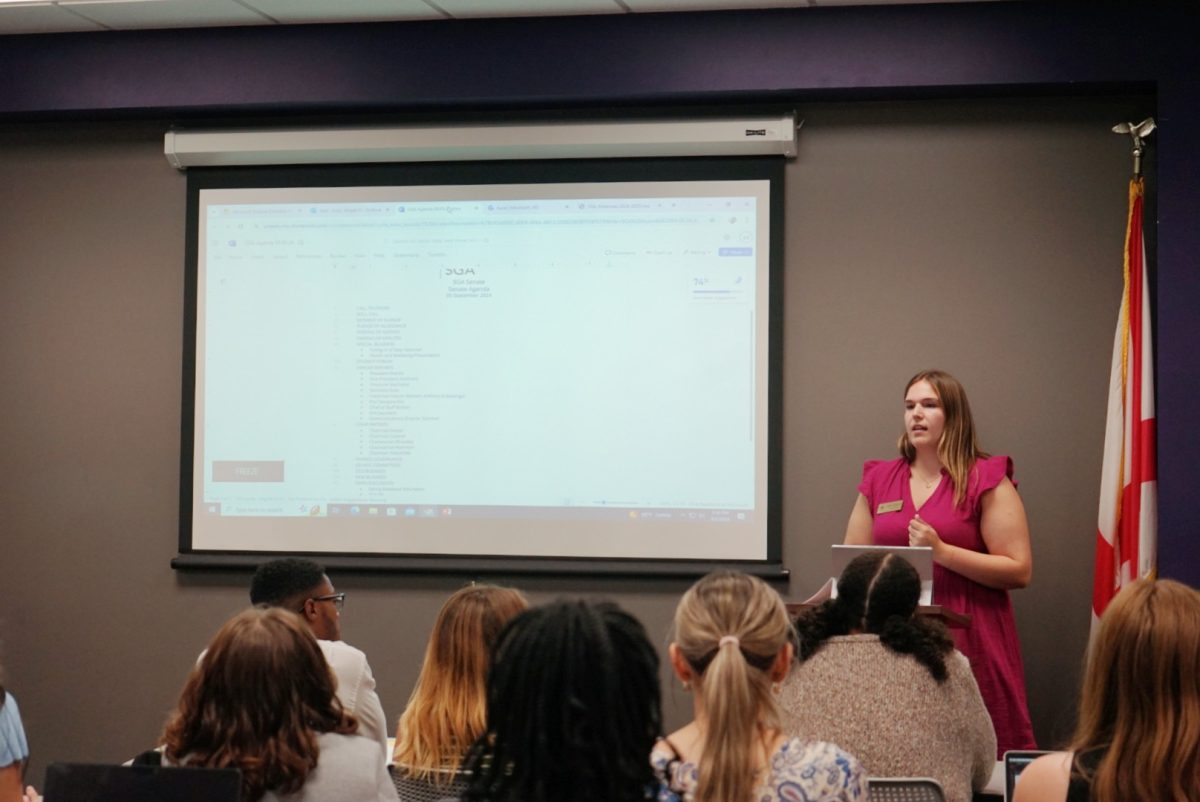The University of North Alabama University Health Services presented its vision for a culture of on-campus public health with the Student Government Association on Thursday, Sept. 5. The presentation was given by Sheena Burgreen, Executive Director for Health and Well-Being for UHS. After Burgreen’s presentation, the SGA continued their meeting, in which they discussed plans for future events and plans to fill open senate seats.
Burgreen opened up her presentation by presenting her purpose in meeting with the SGA, stating that University Health wants to receive feedback from the student population at UNA on what it means to be a “Health Promoting University”.
“What is a Health Promoting University?” asks Burgreen. “It is an international identity.”
A large part of Burgreen’s presentation was centered around the Okanagan Charter, which UNA has yet to formally adopt. This charter was created by the International Health Promoting Colleges Network to function as a call to action for universities across the world to work towards promoting a healthy campus culture, as opposed to simply treating the symptoms of an unhealthy campus.
The first institution to formally adopt the charter in the United States was the University of Alabama at Birmingham, which did so in December 2020. There are currently 29 members of the charter in the United States, including other large schools such as the University of Michigan, the University of California in Los Angeles and Kansas State University.
Burgreen says that a university can adopt the Okanagan Charter, and in doing so, the school shows its aspiration to infuse a health-focused mindset into everything they do. She says the charter drives institutions that adopt it to promote a way of life focused specifically on compassion, well-being and equity.
In addition to the on-campus impact brought about by the charter, it also helps strengthen the ecological and social sustainability of communities around its member universities.
After laying the groundwork of what a “Health Promoting University” is, Burgreen began describing what it looks like in practice. She says that research shows members of the Okanagan Charter fulfill a larger role in medical research, postgraduate medical training, health-focused curriculum and more.
“We are really doing a lot of these things on campus already,” says Burgreen. “This idea of a health-promoting university is not far-fetched in that it is something we’re going to have to go out and do. It’s sort of changing the way you think about things you are already planning to do– looking at it through a different lens.”
UHS has been discussing the Okanagan Charter with several departments of the university, as well as SGA, since the Spring of 2024. Though the university has not officially adopted the charter, Burgreen and others say that UNA has done well to work towards some of the charter’s goals on its own. With that being said, UHS does intend to officially adopt the charter at some point in the future.
SGA Vice President Mandy McGinnis says that officially adopting the charter will help UNA continue its work toward promoting health on campus. She also says that the charter will drive us to not only promote physical health but also mental and social health.
Other members of the SGA affirm McGinnis’s statement. Olivia Britton, Chief of Staff for the SGA emphasized the importance and influence of the charter, saying, “This is a big ordeal that is sweeping through campuses across the country and the world.”
Britton also says that UNA’s focus on the principles of these charters, despite having not adopted it yet, gave her a sense of pride in her university. Even so, she also says the work is not done.
“There is always room for improvement,” says Britton. “The more that students engage with the Okanagan Charter, the better UNA can be at promoting a healthy college lifestyle.”








